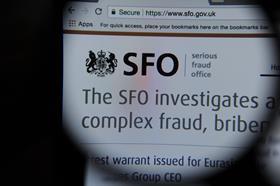A former Serious Fraud Office investigator has told an employment tribunal that he blew the whistle on the organisation because staff had been told not to record anything critical of investigations as this could undermine prosecutions.
Philip Jackson, an investigator at the SFO from 2019 until earlier this year, is bringing a public interest disclosure claim. It relates to three alleged protected disclosures, and a pay claim.
The SFO denies the allegations. Jackson’s alleged protected disclosures do not meet that definition, the agency claims, and were raised only after his temporary promotion to principal investigator, between December 2022 and November 2023, ended.

Jackson claims he challenged the approach that emails containing observations critical of an investigation should not be sent as they could potentially be used against the prosecution. Tom Perry, for the SFO, put to Jackson that the organisation had requested matters be raised orally at weekly meetings, at which minutes were also taken, before they were put in writing.
Jackson responded: ‘People that have a duty to record and retain information are being told not to. They have been told not to write these emails.’ He told the tribunal the suggestion of raising concerns or observations orally first was ‘likely to discourage’ people from speaking up at all.
Read more
He added: ‘To make a decision orally within a meeting saying “do not record that, that is not relevant” is not the way we should be doing things. We should be recording everything.’ Jackson alleges he blew the whistle as he was concerned that the instruction was in breach of the Criminal Procedure and Investigations Act code of practice.
He told the tribunal that the prosecution in question, redacted by an order of the ET, ‘unravelled’ in court.
‘I was proved right,’ he added. ‘I do have a general frustration with the SFO because it is slow and I think it could be a lot faster.’
In a statement to the Gazette, the SFO said: ’We act in line with Civil Service processes and employment law and vigorously reject these claims. We are continuing to engage with the tribunal.”
The case continues.


























